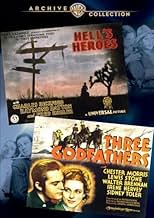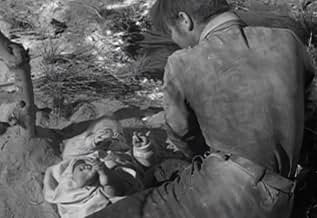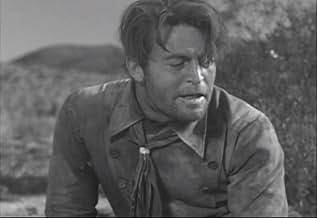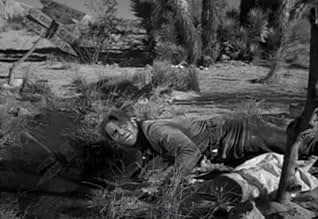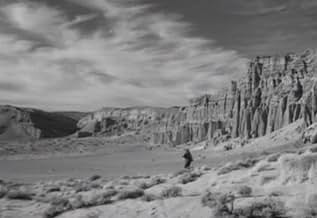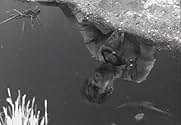IMDb RATING
7.3/10
1.1K
YOUR RATING
Three fugitives risk their lives to bring a newborn baby out of the desert to safety.Three fugitives risk their lives to bring a newborn baby out of the desert to safety.Three fugitives risk their lives to bring a newborn baby out of the desert to safety.
Jean Kircher
- Baby
- (as Jean Kirchner)
Bernard Carr
- Ralph
- (uncredited)
Richard Cramer
- Prospector Dancing with Blackie
- (uncredited)
Featured reviews
This touching moral lesson had been done as a silent version and in another version which is more known because of the renown of its director John Ford, but this version is equally as good as the latter version. Being an MGM version, it's a bit smaltzy as MGM movies of the thirties tended to emphasize that aspect of a story but director, Richard Boleslawski is able to keep the proceedings honest and true. Chester Morris, Lewis Stone and Walter Brennan are very good as the outlaws who ride into and rob a bank in a pious town - Chester Morris plays the "I don't give a damn" cowboy perfectly and with resonance. They make their getaway and in the desert find a baby, and the psychological issues of right and wrong as their paternal, maternal and surrogate parental instincts that exist in all of us take over. As they try to save the child, the trials and tribulations they go through bring out the best qualities of human nature in all of them in us, the audience, as well.
This is apparently the second remake of this film. While I have not seen the two prior versions, I did see the 1948 John Wayne remake and the two films are different enough (especially the endings--I preferred the more realistic way it was handled in this version) and I recommend you see both. And, overall I strongly prefer this film to the 1948 one.
Chester Morris was the main star in this film, though today he's mostly been forgotten despite the many films he starred in during the era. The other two co-star bandits are Lewis Stone (yes, the kindly "Judge Hardy" from the Hardy Family series) and Walter Brennan. All did a competent job and the entire movie is well written and directed and is far more watchable than the average Western. About the only problem, and it's a minor one, is that occasionally the film becomes a little bit too melodramatic and heavy-handed. But it also gets high marks for being less predictable and more entertaining that what you usually find in the genre.
Chester Morris was the main star in this film, though today he's mostly been forgotten despite the many films he starred in during the era. The other two co-star bandits are Lewis Stone (yes, the kindly "Judge Hardy" from the Hardy Family series) and Walter Brennan. All did a competent job and the entire movie is well written and directed and is far more watchable than the average Western. About the only problem, and it's a minor one, is that occasionally the film becomes a little bit too melodramatic and heavy-handed. But it also gets high marks for being less predictable and more entertaining that what you usually find in the genre.
In 1929 actor Chester Morris was nominated for an Oscar for his strong performance as an ex-con in Alibi; he spent a good deal of his life playing tough-guy roles, too often typecast in second-tier "B" roles; here, some six years later, he gives a dynamic, believable turn as the bad boy of the town, the man in black who revels in his nastiness, unredeemed by the love of a good woman or anyone else.
He and two others pal up together to rob a bank during a church social, and run for the hills, there discovering a dying woman with a child; this could be a really silly melodramatic set-up, but director Richard Boleslawski knows what he is doing, knows how much melodrama to inject into a situation, is able to focus two of the best scene stealers in the business, Walter Brennan and Lewis Stone into producing distinctively compelling characters.
This film is a remake of several silent versions, the most notable starring Charles Bickford in the Chester Morris role (and later, more sentimentally, by John Wayne in a color version from John Ford), but the sense of authenticity in the town scenes and the visually arresting desert scenery give the actors a canvas which they do not fail to brilliantly fill in.
How often does a character in a Western film recite Macbeth's "Tomorrow" soliloquy from memory, or discuss the intricacies of Schopenhauer with a friendly but uncomprehending cowpoke? Lewis Stone manages a nice turn in his interchanges with Walter Brennan, himself putting the brakes on his usual cornball rustic.
The transformation for Chester Morris from unregenerate bum to something admirable is powerfully done, and the intrusion of some 1930's sentiment not entirely unwelcome.
In 1936, the Best Oscar nominees were Paul Muni, Spencer Tracy, Gary Cooper, William Powell and Walter Huston; with a better agent, Chester Morris might have been among them.
Three Godfathers (1936)
*** (out of 4)
Extremely warm Western has three ruthless outlaws (Chester Morris, Lewis Stone, Walter Brennan) robbing a bank at Christmas time and then heading off into the desert. While on their getaway they come across a dying mother and her young child so the men take the child to try and get it to some place safe. After a bit of bad luck the three find themselves nearing death themselves and to get the baby home it might cost them their lives. I'm sure most people are familiar with the John Ford vehicle with John Wayne but this version is so much better for numerous reasons. The biggest reason is that this version is a lot darker and more grittier than the Ford film, which always seemed a tad bit too cute to me. This film has a lot of dark moments and depends on religion a lot more as well. There's also some nice humor scattered through this film including a great bit with a Santa Clause. Both Morris and Brennan are very good in their roles with Morris giving a very good turn as a really mean guy. Stone steals the film as the older man who tries to talk the other two into having some good in their hearts. Sidney Toler has a small supporting role.
*** (out of 4)
Extremely warm Western has three ruthless outlaws (Chester Morris, Lewis Stone, Walter Brennan) robbing a bank at Christmas time and then heading off into the desert. While on their getaway they come across a dying mother and her young child so the men take the child to try and get it to some place safe. After a bit of bad luck the three find themselves nearing death themselves and to get the baby home it might cost them their lives. I'm sure most people are familiar with the John Ford vehicle with John Wayne but this version is so much better for numerous reasons. The biggest reason is that this version is a lot darker and more grittier than the Ford film, which always seemed a tad bit too cute to me. This film has a lot of dark moments and depends on religion a lot more as well. There's also some nice humor scattered through this film including a great bit with a Santa Clause. Both Morris and Brennan are very good in their roles with Morris giving a very good turn as a really mean guy. Stone steals the film as the older man who tries to talk the other two into having some good in their hearts. Sidney Toler has a small supporting role.
Three Godfathers is a wonderful little (for MGM) film that keeps its' story simple and to the heart. Three bank robbers find a woman dying in the desert and as she dies they decide to save her baby to the risk of their own lives. This is also the third of four versions of this story; with each filmed over a 32 year span with each film well-documenting the growth of the quality of filmmaking technology and technique in that era. The 1916 silent version, which is lost, demonstrates the early years of 3 act narrative film storytelling. The 1929 version shows the then-brand new sound technology; this 1936 film illustrates sound production entering its' prime years with a musical score and more fluid camera work and the 1948 version shows off color photography, which was starting to become the norm for the industry going into the 1950s. It can be said this story, based on a book, is a true stalwart of old-Hollywood and I would argue it would be welcomed to a remake in the 21st Century.
The actors and simple, but impactful direction make the film. Richard Boleslawski, who would sadly die a year later, directs with an abundant use of close-ups for that time. This lets the actors have their moments, and they come through in spades. Chester Morris is the lead and the least moral of the bank robbers. He plays Bob, a man angered by the people in the town, whose bank he is robbing. He is motivated to get back at the town which despises him and the girl who refused him, Molly (Irene Hervey), and he leads the robbery, shooting her new fiancé on his way out of the robbery. He isn't a very sympathetic character until the second half when he must decide what he will do with the helpless baby. Morris is interesting to watch and the depths of depravity in his character are well-played when he tries to pray as he has to face his fate in the end. Lewis Stone is simply outstanding as Doc, an old man who knows his time is short and quickly decides the money he got in the robbery isn't worth a thing compared to the life of the child. He takes on the full responsibility as long as he can and you can read in the melancholy in Stone's acting how his character is at peace with his fate when he looks into the baby's face. Walter Brennan, too, is excellent, as the simple-minded Gus, a middle-aged man, who is good friends with Doc and believes in him and takes on the responsibility too, of feeding and caring for the child at the expense of his own life.
This could be certainly called sentimental, and it is, but the story is so simple, that the sentimentality naturally comes out of it. Any human being with an ounce of morality, who would come upon a helpless baby, would do anything to save it. It's a part of our nature. What is great about this film is watching how each character faces the circumstances he is in and how he reacts to the constantly dangerous scenario of running out of water and being too far from safety in the scorching desert and the sacrifices they have to make with such limitations. The story takes place at Christmas, which makes the three main characters' redemption a religious allegory as they save the child, valuing the promise of an innocent over themselves. Doc's philosophical nature also lends this film to being much more thoughtful than your average western. The mixing of the brutality of the old west, with religion and philosophy give this a heartening feeling. Highly recommended to fans of simple, effective and emotional storytelling.
The actors and simple, but impactful direction make the film. Richard Boleslawski, who would sadly die a year later, directs with an abundant use of close-ups for that time. This lets the actors have their moments, and they come through in spades. Chester Morris is the lead and the least moral of the bank robbers. He plays Bob, a man angered by the people in the town, whose bank he is robbing. He is motivated to get back at the town which despises him and the girl who refused him, Molly (Irene Hervey), and he leads the robbery, shooting her new fiancé on his way out of the robbery. He isn't a very sympathetic character until the second half when he must decide what he will do with the helpless baby. Morris is interesting to watch and the depths of depravity in his character are well-played when he tries to pray as he has to face his fate in the end. Lewis Stone is simply outstanding as Doc, an old man who knows his time is short and quickly decides the money he got in the robbery isn't worth a thing compared to the life of the child. He takes on the full responsibility as long as he can and you can read in the melancholy in Stone's acting how his character is at peace with his fate when he looks into the baby's face. Walter Brennan, too, is excellent, as the simple-minded Gus, a middle-aged man, who is good friends with Doc and believes in him and takes on the responsibility too, of feeding and caring for the child at the expense of his own life.
This could be certainly called sentimental, and it is, but the story is so simple, that the sentimentality naturally comes out of it. Any human being with an ounce of morality, who would come upon a helpless baby, would do anything to save it. It's a part of our nature. What is great about this film is watching how each character faces the circumstances he is in and how he reacts to the constantly dangerous scenario of running out of water and being too far from safety in the scorching desert and the sacrifices they have to make with such limitations. The story takes place at Christmas, which makes the three main characters' redemption a religious allegory as they save the child, valuing the promise of an innocent over themselves. Doc's philosophical nature also lends this film to being much more thoughtful than your average western. The mixing of the brutality of the old west, with religion and philosophy give this a heartening feeling. Highly recommended to fans of simple, effective and emotional storytelling.
Did you know
- TriviaWhen the godfathers are dying of thirst, Walter Brennan asks Doc about a person in the bible who brought water out of a rock. Doc replies that that was Moses. The same exchange is made in another Walter Brennan classic, Northwest Passage. Only there the men are dying of hunger and the actor asking the question is Spencer Tracey. Answering is Robert Young. Brennan only looks on.
- Goofs(at about 45 mins) When Doc arrives to the place where the baby's mother is buried, there is a shadow covering only a small area where the rock pile and cross are. In the very next edit, the site is in total sunlight, with nothing nearby that could have cast such a shadow, too small and well-defined to have been cast by a cloud.
- Quotes
Robert 'Bob' Sangster: There ain't no Santy Claus!
- ConnectionsReferenced in The Incredible Hulk: Two Godmothers (1981)
- SoundtracksShe'll Be Comin' 'Round the Mountain When She Comes
(uncredited)
Traditional
Played at the Christmas social
- How long is Three Godfathers?Powered by Alexa
Details
- Runtime
- 1h 21m(81 min)
- Color
- Aspect ratio
- 1.37 : 1
Contribute to this page
Suggest an edit or add missing content

